Before we head off to Portland for AWP ’19, we thought we would share what ZYZZYVA recommends this month—a roundup of the works we’ve been reading, watching, and listening to:
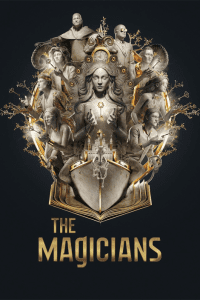 Katie O’Neill, Intern: The abundance of streaming services available online have largely killed any urge I have to watch live TV. Outdated advertisement breaks combined with the difficulty of committing to a set time make it more effort than it’s generally worth to catch a program as it airs. But, every Wednesday night at 9pm I can be found in front of my TV tuned in to SYFY to catch the latest episode of The Magicians.
Katie O’Neill, Intern: The abundance of streaming services available online have largely killed any urge I have to watch live TV. Outdated advertisement breaks combined with the difficulty of committing to a set time make it more effort than it’s generally worth to catch a program as it airs. But, every Wednesday night at 9pm I can be found in front of my TV tuned in to SYFY to catch the latest episode of The Magicians.
Based on the trilogy of the same name by Lev Grossman, the show recently entered its fourth season, and the first to not be based on the books’ canon. Remarkably, it has largely avoided the stumbles that naturally accompany this sort of departure and is continuing to come into its own as one of the most inventive shows on air today.
The Magicians can be most succinctly described as, “Harry Potter meets The Chronicles of Narnia, but in grad school.” The series follows Quentin Coldwater, an awkward, deeply insecure Columbia graduate who is obsessed with the Narnia-esque children’s series “Fillory and Further.” Played by the wonderful Jason Ralph, who brings a sympathetic quality the self-hating Quentin of the books lacked, Quentin discovers that magic is real when he is selected to take an entrance exam for the magical grad school Brakebills University. He passes and is quickly pulled into the orbit of several older students, most notably the haughty, regal Margo Hanson (Summer Bishil) and the charismatic hedonist Eliot Waugh (Hale Appleman).
Three seasons later, after becoming the new royalty of Fillory, defeating several increasingly powerful villains, and killing a few gods, the Brakebills crew is struggling to restore magical freedom. On a show largely driven by the strength of its characters, it is the connection between Quentin and Eliot that is perhaps the most compelling. Many fans of the books believe their relationship is a fundamentally romantic one, and in the most recent seasons the show has embraced this idea. In season three, the poignant and beautiful episode “A Life in the Day” explored their relationship by sending them back in time to spend fifty years solving an impossible puzzle. They shared a brief kiss and grew old together, and fortunately for fans the duo retained the memory of their alternate lives once they returned to their real ones.
Their connection continues to develop in season four, even though Eliot’s body has been taken over by a malignant force known as the Monster. Their relationship is one of the best portrayals of queer friendship and love on the air, and only promises to grow stronger as the season continues. In addition to the queer experience, the series also explores issues of mental health, sexual assault, substance abuse, and the difficulty of maintaining healthy adult friendships. When combined with inventive plotlines, wonderful special effects, and a welcome embrace of whimsy, the series has become something truly great and arguably transcends the (already fantastic) books it’s based on.
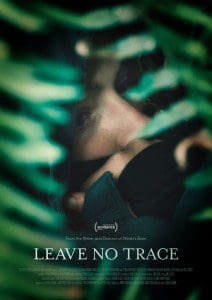 Oscar Villalon, Managing Editor: If you followed the round-ups of movies overlooked by the Academy Awards this year, you would’ve seen director Debra Granik’s Leave No Trace in any one of them. Set in the contemporary Pacific Northwest, her film (based on Peter Rock’s 2009 novel, My Abandonment) is a marvel of rich detail and moving understatement. Just as in her 2010 movie Winter’s Bone, we are presented with a community in crisis (vets afflicted with PTSD in this instance), and our entry into their lives is through the protagonist of an adolescent girl. The bond between the girl (Thomasin McKenzie) and her father (the underrated Ben Foster) is palpable. Their existence together—related in intimate scenes of them cooking, sleeping, foraging, traveling, and reading—is an anxious one but also enticingly warm. And the narrative that unfurls demonstrates again how wisdom comes with accepting how powerless you are to change the lives of some people, but that doesn’t mean you don’t keep showing your love for them as best you can.
Oscar Villalon, Managing Editor: If you followed the round-ups of movies overlooked by the Academy Awards this year, you would’ve seen director Debra Granik’s Leave No Trace in any one of them. Set in the contemporary Pacific Northwest, her film (based on Peter Rock’s 2009 novel, My Abandonment) is a marvel of rich detail and moving understatement. Just as in her 2010 movie Winter’s Bone, we are presented with a community in crisis (vets afflicted with PTSD in this instance), and our entry into their lives is through the protagonist of an adolescent girl. The bond between the girl (Thomasin McKenzie) and her father (the underrated Ben Foster) is palpable. Their existence together—related in intimate scenes of them cooking, sleeping, foraging, traveling, and reading—is an anxious one but also enticingly warm. And the narrative that unfurls demonstrates again how wisdom comes with accepting how powerless you are to change the lives of some people, but that doesn’t mean you don’t keep showing your love for them as best you can.
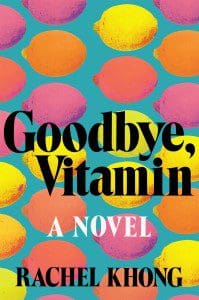 Casey Jong, Intern: Released in 2017, Goodbye, Vitamin was Rachel Khong’s first novel. I didn’t get around to reading it until the following year, but now as I grow older alongside my parents, it’s become something of a staple on my bookshelf. The award-winning novel follows the life of our narrator Ruth, age 30 and single, as she moves back in with her parents. Her life isn’t quite falling apart, but her last serious relationship came to a devastating end, and her father is suffering from Alzheimer’s, causing him to sometimes mistake his wife for his mistress or leave the house unattended and undressed. Ruth struggles to settle back into her childhood home and recover from her own heartbreak while watching her parents’ relationship become fractured by her father’s illness. Sometimes, it feels as though she’ll never find peace in the single life or her role as a caretaker, but Khong brilliantly coaxes the sweetness and the humor out of life’s tough moments:
Casey Jong, Intern: Released in 2017, Goodbye, Vitamin was Rachel Khong’s first novel. I didn’t get around to reading it until the following year, but now as I grow older alongside my parents, it’s become something of a staple on my bookshelf. The award-winning novel follows the life of our narrator Ruth, age 30 and single, as she moves back in with her parents. Her life isn’t quite falling apart, but her last serious relationship came to a devastating end, and her father is suffering from Alzheimer’s, causing him to sometimes mistake his wife for his mistress or leave the house unattended and undressed. Ruth struggles to settle back into her childhood home and recover from her own heartbreak while watching her parents’ relationship become fractured by her father’s illness. Sometimes, it feels as though she’ll never find peace in the single life or her role as a caretaker, but Khong brilliantly coaxes the sweetness and the humor out of life’s tough moments:
If I were you is something I’ve never really understood. Why say, “If I were you”? Why say, “If I were you,” when the problem is you’re not me? I wish people would say, “Since I am me,” followed by whatever advice it is they have.
Goodbye, Vitamin, though one could argue its central theme is loss, doesn’t hang idly on what’s been lost–Ruth’s ex, Joel, or her father’s memory–nor does it ascribe too much significance to kernels of joy whenever Ruth comes across them. This novel, both distressing and utterly relatable, captures the ebb and flow of life through common themes of love and loneliness, the passage of time, and the gift of forgiveness:
You repeated about how nice the day was, either because you really wanted me to know it or because you’d forgotten you already mentioned it, but all of a sudden, it didn’t matter what you remembered or didn’t, and the remembering–it occurred to me–was irrelevant. All that mattered was that the day was nice.
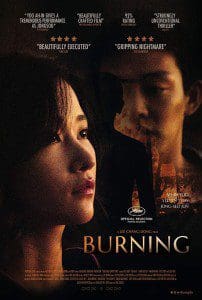 Zack Ravas, Editorial Assistant: Burning represents Korean auteur Lee Chang-dong’s (Secret Sunshine, Oasis) first film in nearly a decade, and it arrives with enough thematic heft to suggest Lee has had a great deal on his mind during that time. The movie draws its source material from a short story by internationally renowned author Haruki Murakami, though Murakami’s story serves as more of a skeletal framework – not unlike the wire frames of the abandoned greenhouses Steven Yuen’s character claims he is so fond of torching to the ground. Perhaps the most critical change Lee makes is reducing the age of the protagonist; whereas the narrator of Murakami’s “Barn Burning” is a married, seemingly successful novelist in his thirties, Yoo Ah-in plays a recent college graduate with a Creative Writing degree and few career prospects.
Zack Ravas, Editorial Assistant: Burning represents Korean auteur Lee Chang-dong’s (Secret Sunshine, Oasis) first film in nearly a decade, and it arrives with enough thematic heft to suggest Lee has had a great deal on his mind during that time. The movie draws its source material from a short story by internationally renowned author Haruki Murakami, though Murakami’s story serves as more of a skeletal framework – not unlike the wire frames of the abandoned greenhouses Steven Yuen’s character claims he is so fond of torching to the ground. Perhaps the most critical change Lee makes is reducing the age of the protagonist; whereas the narrator of Murakami’s “Barn Burning” is a married, seemingly successful novelist in his thirties, Yoo Ah-in plays a recent college graduate with a Creative Writing degree and few career prospects.
Toiling on his father’s farm near the Korean border, Yoo Ah-in is forced to listen day and night to the propaganda being blasted from a speaker across the Northern side of the DMZ. Yoo seems to spend most of his time alone, scrounging for odd jobs and deriving what pleasure he can from the rare smoke break. He is forced to contend with the realities of a modern Korean society that has whole-heartedly embraced the values of cutthroat capitalism and, in the process, left behind a generation of young people, those with no family or class connections to speak of. The sense of desperation and resentment experienced by Yoo Ah-in and his peers simmers just below the surface of the film.
At least Yoo Ah-in’s romantic life appears a bit more hopeful when he runs into a former classmate (a radiant Jeon Jong-seo in her screen debut) and soon finds himself in her bed. Their dalliance ultimately lands Yoo Ah-in in the middle of a love triangle, however, after Jong-seo connects with the wealthy and enigmatic Ben (played by Steven Yuen) on a trip abroad. It is only later, after Jeon’s sudden and unexplained disappearance, that Yoo Ah-in begins to suspect Yuen’s well-mannered exterior might be hiding something far more sinister.
Much in the way Lynne Ramsay’s You Were Never Really Here updated Taxi Driver for our ugly and digital 21st century, Burning at times feels like Lee Chang-dong’s response to classic Hitchcock pictures like Vertigo and Rear Window. Even in a film year as crowded as 2018, Burning’s depiction of sexual obsession and economic rage holds a unique staying power. The film’s core trio delivery uniformly excellent performances, from Yoo Ah-in’s aloof, almost socially stunted protagonist to Jeon Jong-seo’s troubled young woman and Steven Yuen’s chilling depiction of an upper class sociopath. Somehow Yuen turned a yawn into one of the most disquieting movie moments of the last year (you’ll know when you see it). Newcomers should also find Burning a terrific entry-point into contemporary Korean cinema, as it’s likely to appeal to any viewer who appreciates thrillers that are light on action and long on mood.
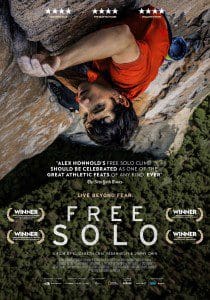 Laura Cogan, Editor: After Free Solo won the Oscar for Best Documentary Feature it reappeared in theaters so latecomers like me could have another chance to see it on the big screen. Rarely have I found a documentary that so rewards a large screen viewing, for part of the thrill here is the visceral, palm-sweating anxiety of watching Alex Honnold spirit himself up the mostly sheer face of Yosemite’s El Capitan without ropes. It seems to me Free Solo is exceptional mostly for allowing so many to witness something rarely done (in the case of El Cap, to be specific, never done), and even more rarely seen. It’s an impressive feat of physical strength and mental focus and endurance. But I what I found most compelling was the understory, which was not so unusual at all.
Laura Cogan, Editor: After Free Solo won the Oscar for Best Documentary Feature it reappeared in theaters so latecomers like me could have another chance to see it on the big screen. Rarely have I found a documentary that so rewards a large screen viewing, for part of the thrill here is the visceral, palm-sweating anxiety of watching Alex Honnold spirit himself up the mostly sheer face of Yosemite’s El Capitan without ropes. It seems to me Free Solo is exceptional mostly for allowing so many to witness something rarely done (in the case of El Cap, to be specific, never done), and even more rarely seen. It’s an impressive feat of physical strength and mental focus and endurance. But I what I found most compelling was the understory, which was not so unusual at all.
To be clear, I have no knowledge of (or particular interest in) rock-climbing, mountaineering, or any kind of extreme sport. I came to the movie with only the near-universal curiosity that draws me to many a documentary, and left with the familiar sense that even in the most niche of human activities lies a microcosm of the entire universe of human pathos. Here, for example, we find a young man doing something most of us find nearly incomprehensible for reasons that are completely un-extraordinary. Family dynamics are the wellspring of so much suffering, and so much striving and seeking—and that seems to be at least part of Honnold’s story. Something that begins as the need to perform well for one’s parents can take all kinds of strange, distorted shapes over the course of a person’s life. (Granted, abnormalities in Honnold’s amygdala are likely a contributing factor to the direction he’s taken as well.)
Even as he works meticulously to plan every foot and finger-hold of his upcoming climb, a task that demands his full concentration and the personal stakes of which simply could not be higher, he seems most flummoxed—and profoundly challenged—by his fledgling relationship. Honnold is often rude and immature, especially in his commentary on relationships, and I had to laugh in sympathy when I heard other people in the theater call him a jerk at a couple points. But there were other moments when he’d say something almost profound and it seemed lost on the audience. At one point he’s thinking aloud, trying to balance his relationship against his ambitions, and notes with consternation that his girlfriend simply wants to be happy. But, he says (as well as I can remember the line), “Nobody achieves anything great by being happy and cozy.” He’s not entirely correct, of course, as a stable and nurturing home life has contributed to the great work of many. But he’s not entirely wrong, either, because there is always an element of personal exposure in attempting to do something great, or even to live a different kind of life. Perhaps dwelling mostly in literature gives you an appreciation for the eccentric. Certainly I have a well-established predisposition for rooting for an underdog, and a seeker. In any case, I found myself anxious for Honnold to complete his historic climb safely, but also to find the right words to say to his girlfriend when he called her from the top.
